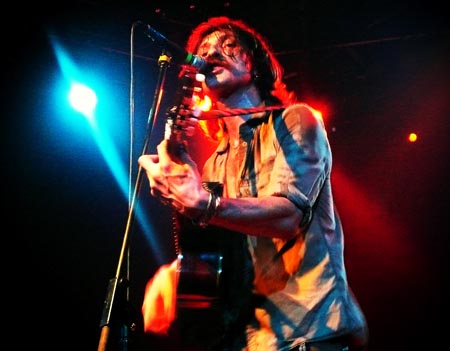y arte contemporáneo
ARTÍCULOS
Gogol Bordello in Madrid

On the south side of Manhattan we find the neighbourhood of Loisaida (a term stemming from the Latin pronunciation of Lower East Side), which has traditionally been home to humble Puerto Ricans and Russians. It is only now, in the new century, that it has been taken over by students, artists and wealthy bohemians. It is in this transition from the rootless and ragged immigrant to young hip culture that has been built the tower of Babel that is Gogol Bordello, which first emerged in the late 1990s.
"Familia unbreakable", is the Spanglish slogan which accompanies the band’s giant slingshot, the logo which crowns the backdrop to this Casa Gogol Tour, an extensive tour which began last February with a concert supporting Tibet at the Carnegie Hall in New York, along with artists of the stature of Patti Smith, Iggy Pop and Regina Spektor. In fact, these nine characters make up a true multi-ethnic family, a melting pot of ages, genders and nationalities, where first- and second-generation musicians and artists from Russia, Ecuador, Ethiopia and Israel, to name a few, come together onstage to offer a wild and infectiously energetic show, as was confirmed by the not excessively large audience which watched them at the Sala La Riviera in Madrid. An audience full of contrasts, just like these vastly cultivated musicians (whoever doubts this needs only visit their official website, where each member recommends three films, books and records) “disguised” as guerrilla fighters, vagabonds, rappers and punks.
Critics have highlighted the large palette of influences and the melodic richness of their fifth album, where Brazilian folklore plays an important part, as this is the new country of residence of the singer and main composer in the band, Eugene Hütz, whom many will remember as the co-protagonist in the film Everything is illuminated. Under the title Transcontinental Hustle, their latest album stands out for its lyrics (with songs in Spanish, English, Portuguese and unusual hybrids such as My Companjera, one of the most popular songs amongst the audience), where their habitual revolutionary slogans are combined with metaphorical delirium and references to Kafka as well as, of course, to Nikolai Gogol himself, the oft-proclaimed main ideological influence of the band. This lyrical and sonic cocktail is largely lost in the live performance, a true sound bulldozer which invites the audience to release adrenalin, jumping and screaming, fists in the air. The occasionally deafening percussion caused the violin and accordion melodies, which are essential to the band’s sound, to be sometimes diluted in the wild loudness of a drum sound which was more suited to a hard rock band. However, while the songs lose some of their nuances when played live, they double their intensity and the direct connection they establish with the audience, turning this festive show into something almost theatrical, ethylic and untameable, which has not been seen in our country for quite some time. Not for nothing did Manu Chao himself (whom Gogol Bordello tend to pay homage to by playing the hit by his band Mano Negra, Mala vida) recently declare that he could see himself playing after any band in the universe except this New York group, as it leaves it audience so “flaming” that it is impossible to “bring them down” or “surpass them”.
Finally, it should be pointed out that, in this tour, they are accompanied by Mariachi el Bronx, a band from California which counts among its members the son of the founder of Los Lobos, David Hidalgo, and which has evolved from the Los Angeles hardcore punk from its early days to a very original reinterpretation of the musical legacy of Jalisco.
Ver entrada:

